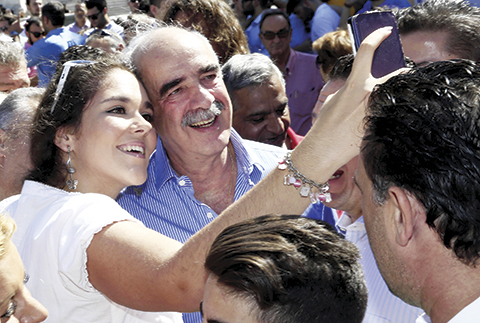ATHENS: Greece heads for a cliffhanger election today with radical former premier Alexis Tsipras taking a slight lead in the race against the conservatives for the helm of a government facing tough economic reforms.
Hours before a midnight ban on voter surveys expired Friday, two polls forecast victory for the youthful Tsipras over conservative party chief Vangelis Meimarakis by margins ranging from 0.7 to 3.0 percentage points. However, pollsters advise caution with many recalling the 2000 election that was decided by a mere 72,000 votes.
A victory for Syriza would deliver "a key message for Europe", Tsipras told his closing rally in Athens on Friday, referring to the refugee crisis and EU economic woes. "Do we want a Europe of austerity or one of solidarity and democracy?" he asked the crowd.
In a white shirt with the sleeves rolled up, Tsipras said voters would say "no to this old system of corruption, no to the enshrining of the oligarch establishment." With nine parties hoping to enter parliament, whoever wins is unlikely to secure an outright majority and Tsipras's Syriza party could well need to ally itself with one of the parties he has criticized.
His former finance minister Euclid Tsakalotos yesterday warned that cooperating with parties "who have built their political power on clientelism" would be difficult. "I don't see how we can change public life and combat tax evasion with such alliances," Tsakalotos told the liberal Kathimerini daily. In a flurry of interviews this week, Tsipras defended his decision to put the country above his party, saying that had he refused to agree the three-year bailout, Greece would likely have been ejected from the euro-zone.
On Friday, he told Antenna TV that he would "tug the rope" in order to secure relief on Greece's huge national debt from EU creditors in the coming months.
A 'costly experiment' Conservative leader Meimarakis hit back in an interview yesterday, dismissing Tsipras's seven months in government as "an experiment that cost (the country) dearly". Tsipras won office in January on an anti-austerity ticket but then upset supporters in July with a U-turn cash-for-reforms deal struck with Greece's international creditors, despite a huge "no" vote in a referendum on the issue.
The left-wing government had earlier also shut banks to avert a deposit run and imposed capital controls that are still felt in the economy. Meimarakis warned voters against re-electing a man who has publicly admitted to opposing the bailout he signed. "Do you know of any other prime minister who brokered a deal, brought it to parliament, voted for it and signed it, whilst saying he does not believe in it?" the conservative chief told the weekly To Vima.
"I fear that if Syriza is elected... the country will soon be led to elections again, and this would be disastrous," said Meimarakis, a 61-year-old former defense minister. Polls open at 0400 GMT on Sunday and close exactly 12 hours later. The first official estimates are expected from the interior ministry after 1800 GMT.
'Shifting sands'
Greek pollsters however calling for caution after polls failed to predict the result of a July referendum on austerity. "It's the first time I've felt unable at this point to make a forecast," political columnist Paschos Mandravelis said. In January, Syriza won office with 36.3 percent of the vote, but Tsipras resigned in August, leading to this weekend's election, with anti-euro hardliners quitting to form a new party, stripping Syriza of a fifth of its members of parliament.
On Friday his flamboyant one-time finance minister Yanis Varoufakis said he would vote for the former Syriza rebels in today's election. The vote is the third this year for Greeks including the referendum, and the fifth in six years as Tsipras seeks a fresh mandate to push through the tough reforms he pledged under the new 86 billion euro ($97 billion) international rescue in July.
Another battle is taking place for third place with neo-Nazi party Golden Dawn and the socialist Pasok party both in the running with around six percent apiece in the polls. Overall, there are more than 9.8 million registered voters, over half of them women, according to interior ministry statistics. Among them, more than 110,000 will be youths voting for the first time. The minimum requirement for parliamentary representation is 3.0 percent of the vote. - AFP
.jpg)




